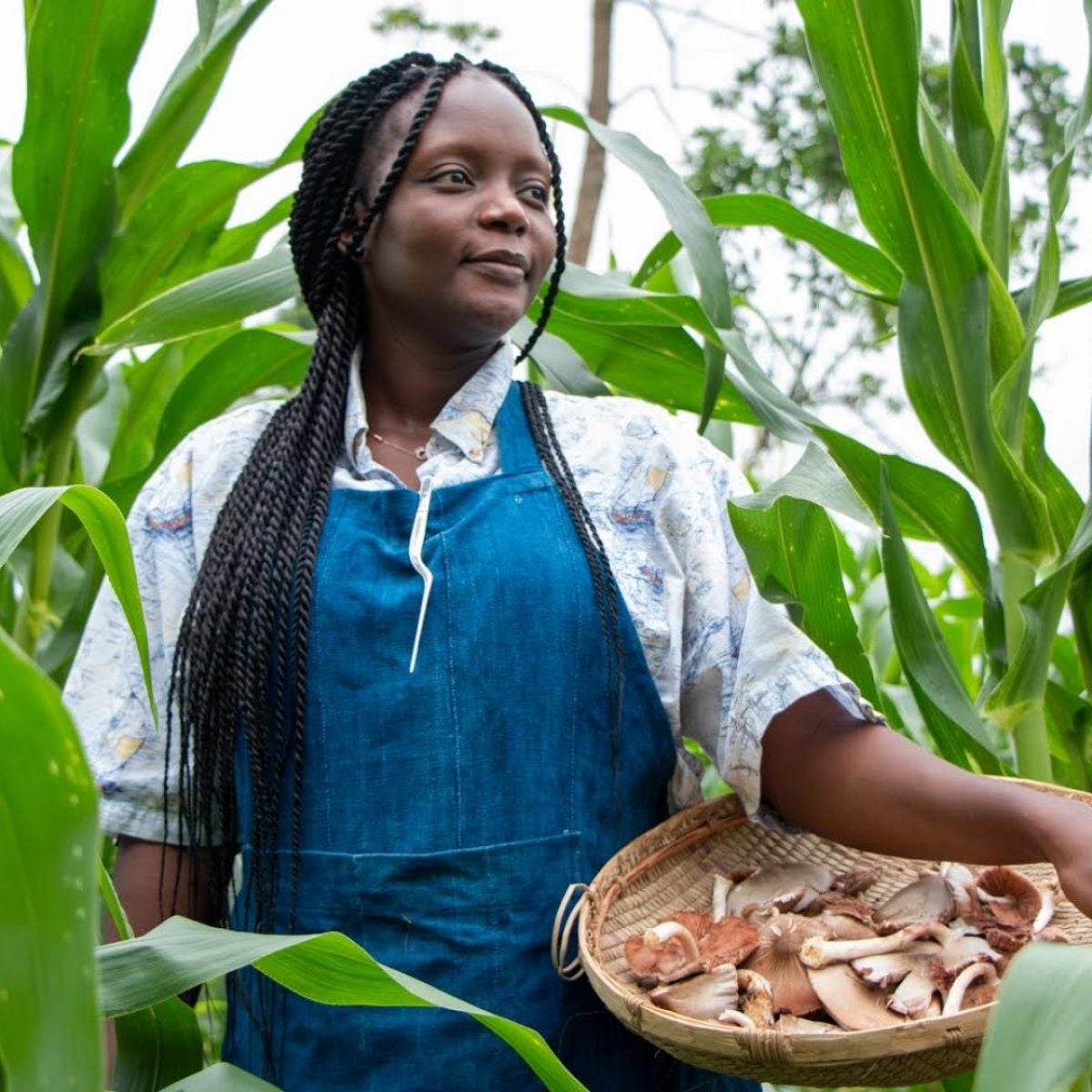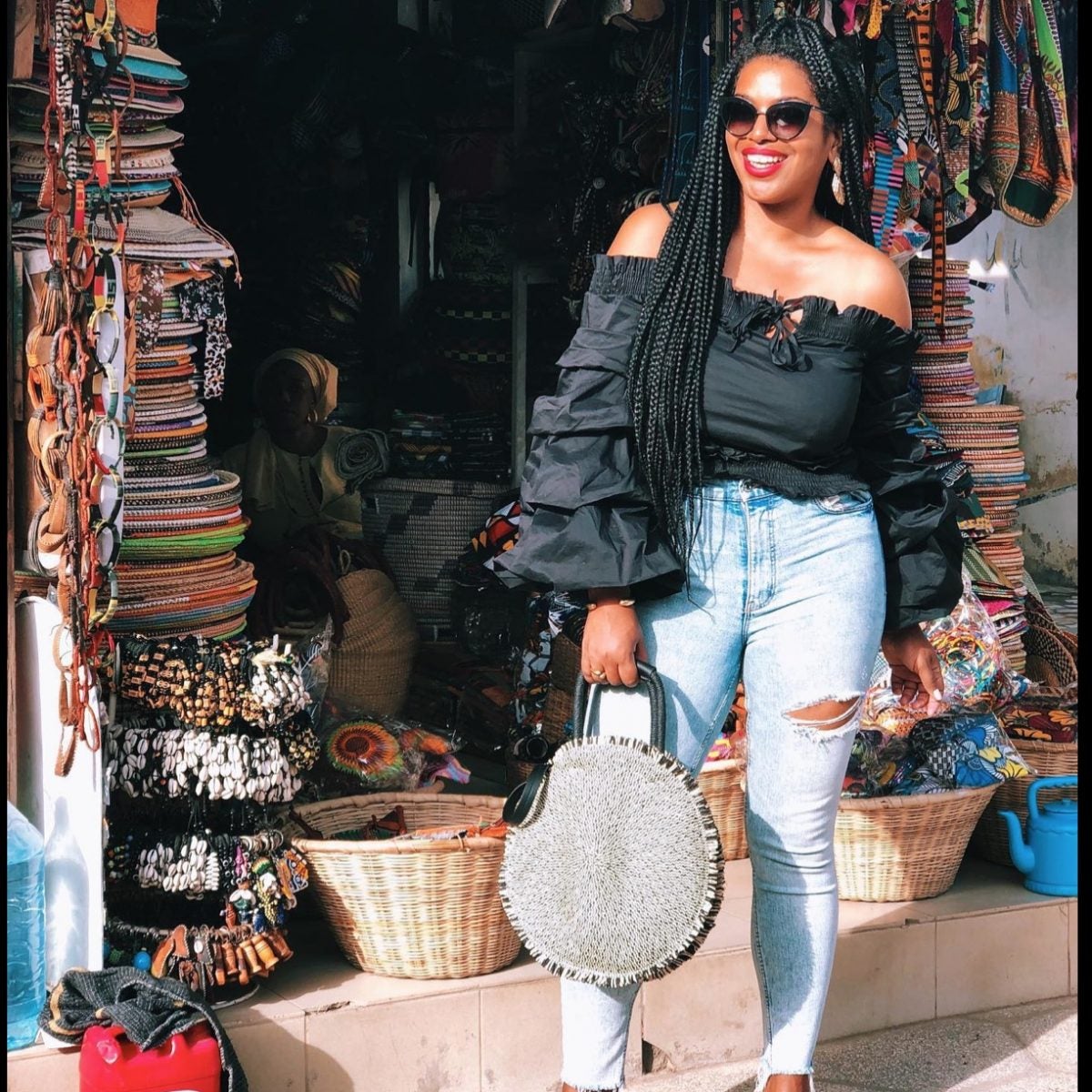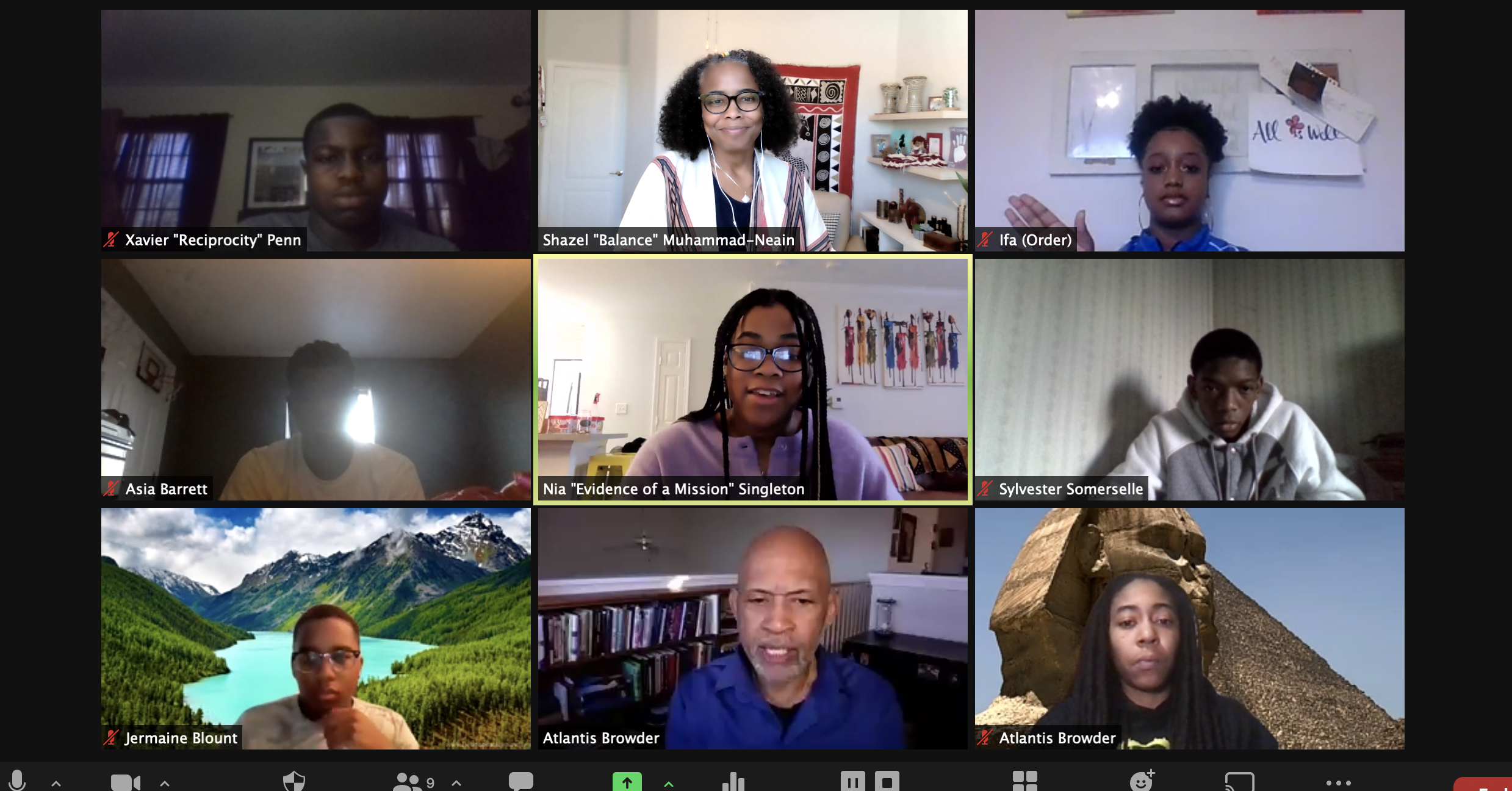By Melissa Noel ·March 31, 2021March 31, 2021
When Chef Fatmata Binta started Fulani Kitchen in Accra, Ghana four years ago, her goal was to promote and preserve Fulani cuisine and culture. “I believe I can touch people by cooking one meal at a time, one plate at a time, one story at a time,” she said.
Through her “Dine On A Mat” pop-up dinners, Chef Binta, who was born in Sierra Leone to Fulanis of Guinean descent, shares stories of her roots and takes diners on a culinary journey of Fulani culture through food. The Fulani are a nomadic people whose cuisine, including staples like sun dried meats and vegetables, dairy and fonio grains, is heavily influenced by this lifestyle. They are one of the largest and culturally diverse ethnic groups in Africa, spread across many countries in West and Central Africa.
 Chef Fatmata Binta picks fresh ingredients on a farm in Ghana. | Photo courtesy of subject
Chef Fatmata Binta picks fresh ingredients on a farm in Ghana. | Photo courtesy of subject
“My business was born out of the idea to just bring people together and build community, just as I did growing up as a Fulani kid eating with my family,” she tells ESSENCE. As founder of Fulani Kitchen, Chef Binta hosts pop-up dining experiences in countries across Africa, but it was also important to her to reach the African diaspora as well.
Forming a partnership with New York City-based travel company Tastemakers Africa in 2018 helped Chef Binta do just that and increase business. Tastemakers, a Black owned travel company, curates African travel and cultural experiences all hosted by local entrepreneurs in Ghana as well several countries in Eastern and Southern Africa.
“The people on Tastemakers are there to provide a service. But more than that is the understanding, that this is a platform that then becomes a launching pad for people to build the largest version of themselves and their dreams,” said founder and CEO, Cherae Robinson. “To do that as Diaspora people and Africans on the continent working together, there is power in that.”
Chef Binta is just one of over 200 entrepreneurs featured on the Tastemakers website. Since the start of the pandemic, the travel company expanded to include virtual experiences and a members-only digital community. They also created The Thread, a virtual event series that brings together leaders in the arts, tech and media in Africa and the diaspora to share resources, explore new ways to create partnerships and best practices for thriving during and after the pandemic.
 Tastemakers Africa, Founder & CEO, Cherae Robinson at Marche Artisanal in Dakar, Senegal | Photo: Tastemakers Africa, Facebook
Tastemakers Africa, Founder & CEO, Cherae Robinson at Marche Artisanal in Dakar, Senegal | Photo: Tastemakers Africa, Facebook
“So that’s why I can say they are like a bridge, a bridge to the Diaspora…that’s the thing about collaboration, I believe in collaboration, it goes a long way,” Binta explained.
Collaborations like this are an example of how Black women entrepreneurs across Africa and the United States are working together to present and promote one of a kind cultural experiences, educational exchanges and improve economic mobility across borders.
There has been a surge in interest for travel to Africa from the diaspora due to several developments including major advancements in DNA testing, airlines expanding their routes to the continent and tourism campaigns like Ghana’s 2019 Year of Return, which commemorated the 400th anniversary of the arrival of enslaved Africans in America and called on the diaspora to come home.
When faced with the COVID-19 pandemic and travel restrictions, these entrepreneurs found innovative ways to keep travelers connected to the continent. As interest in heritage trips to Africa continues to grow for Black Americans, the efforts of these entrepreneurs have created a network of people who are helping to fuel a renewed spirit of Pan-Africanism and investment in the continent.
Shazel Muhammad-Neain was so inspired by her travels to Kenya and Ghana in 2019, that she created The African Link Initiative (ALI) — an identity development program for Black teens to connect with their African heritage.
“I want our youth to be empowered by their African ancestry and be strengthened by that connection to the continent, she said. “We want to inspire them to connect to the continent and contribute to its renaissance in meaningful ways.”
The New Jersey-based program kicked-off its virtual sessions in January in collaboration with several partners including African Ancestry, a Black-owned company helping people of African descent trace their ancestry back to a specific present-day African country and ethnic group of origin. It begins with a DNA test and is followed by skills building workshops that increase self-awareness and cultural pride.
Having to go online due to the pandemic has meant that the program can serve more students in different states. Muhammad-Neain believes there is tremendous opportunity at this time for Black entrepreneurs in the United States and Africa to be innovative, show up for each other through partnerships and educational exchanges and set an example for the next generation.
“I think that’s pretty powerful and it helps those intergenerational connections between families and connections between Africans on the continent and those in the diaspora,” she said.
The ALI program will culminate with a birthright trip to Ghana post pandemic. Participants will have the opportunity to visit historical sites, meet with Ghanaian youth, work on community projects, and learn from local business owners.
 African Link Initiative (ALI) Founder Shazel Muhammad-Neain and cultural historian Anthony Browder lead virtual lesson with program participants. ALI is a cultural identity program for Black teenagers. | Photo courtesy of ALI
African Link Initiative (ALI) Founder Shazel Muhammad-Neain and cultural historian Anthony Browder lead virtual lesson with program participants. ALI is a cultural identity program for Black teenagers. | Photo courtesy of ALI
Until that time comes and travel can return to some level of normalcy, the exchanges and enthusiasm of discovering and connecting with one’s African heritage is happening online through programs like ALI and travel platforms like Tastemakers Africa. “I think that energy to travel to Africa hasn’t gone anywhere. It’s just showing up virtually,” Robinson said.
That desire to travel to Africa and further expand connections between the continent and its diaspora is only being heightened during this time. As travel restrictions begin to lift, these women say they will continue to provide ways for people to connect, collaborate and learn from each other.
“Having these platforms outside of where we are, you know creating that bridge for us and connecting us with people is broadening our network. It’s a revolution, we’re only going to grow from this,” Binta said.
Melissa Noel reported this story with the support of the National Association of Black Journalists’ Ethel Payne Fellowship for Reporting on Africa.
TOPICS: African Culture black women entrepreneurs Full Circle Festival
The post ‘Beyond The Return’: Black Entrepreneurs In U.S. & Africa Fueling Movement For Future Partnerships appeared first on Essence.
